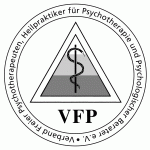Cognitions are the focus of cognitive therapy. Cognitions include attitudes, thoughts, evaluations, and beliefs. Cognitive therapies, including cognitive therapy (CT) and Rational Emotional Behavioral Therapy (REBT), suggest that the way we think determines how we feel and behave and how we react physically . The focus of therapy is
- The awareness of cognition,
- The review of cognitions and conclusions on their adequacy,
- The correction of irrational settings and
- The transfer of the corrected attitudes into the concrete behavior.
The cognitive therapy therefore focuses on the active shaping of the perception process, because ultimately the objective reality, rather than the subjective perception of the viewing person, decides on the behavior. If the cognition is inadequate (eg, through perception selection and evaluation), the possibility of correcting affect and behavior is also impaired. Above all spontaneous and emotionally driven behavior are very influenced by the way in which a human being has structurally structured his model of the environment.
The Socratic Dialogue is a question technique, which therapists use when it comes to the discussion and decision-making in the therapeutic-consultative discussion. It is a process of critically questioning arguments. Structures and patterns of behavior are to be visible, their own thinking and actions are to be understood and thus also changed.


